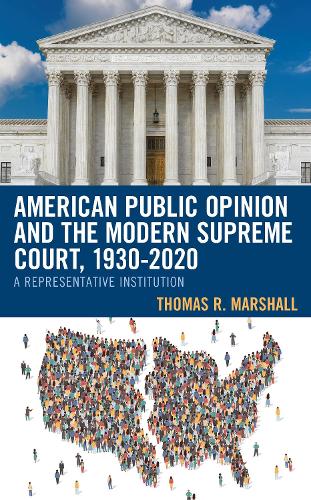
American Public Opinion and the Modern Supreme Court, 1930-2020: A Representative Institution
(Hardback)
Publishing Details
American Public Opinion and the Modern Supreme Court, 1930-2020: A Representative Institution
By (Author) Thomas R. Marshall
Bloomsbury Publishing PLC
Lexington Books
29th April 2022
United States
Classifications
Professional and Scholarly
Non Fiction
Government powers
Politics and government
347.7326
Physical Properties
Hardback
204
Width 158mm, Height 227mm, Spine 21mm
494g
Description
The United States Supreme Court is commonly thought to be an institution far removed from American public opinion. Yet nearly two-thirds of modern Supreme Court decisions reflect popular attitudes. Comparing over 500 Supreme Court decisions with timely nationwide poll questions since the mid-1930s, Thomas R. Marshall shows that most Supreme Court decisions agree with poll majorities or pluralities across time and across issues and often represent Americans views to the same degree as federal policymakers. This book looks beyond the litigants, economic interests, social movements, organized interest groups, or units of governments typically involved and instead examines how well the Court or the justices represent Americans views. Using nationwide public opinion, broken down by key subgroups, race, gender, education, and party affiliation, better describes exactly whom Supreme Court decisions and the justices individual votes best represent. His book will be of interest to scholars in political science, legal studies, history, and sociology.
Reviews
An extraordinary, one-of-a-kind analysis comparing hundreds of public opinion polls since the 1930s on issues before the Supreme Court to the Courts decisions. The two are closer than might be expected, one of the findings in a comprehensive study of a critical linkage in democratic representation.
-- William Crotty, Northeastern UniversityMarshall draws on hundreds of poll questions on specific decisions to demonstrate the modern Supreme Court represents American public opinion. The author traces this patten of representation primarily to a handful of ideologically flexible justices whose votes reflect American attitudes on specific issues. Compiling an invaluable wealth of data on the topic, this book is the most detailed polling-based account of the Supreme Court to date.
-- Kayla Canelo, University of Texas at ArlingtonAuthor Bio
Thomas R. Marshall is professor of political science at the University of Texas at Arlington.
